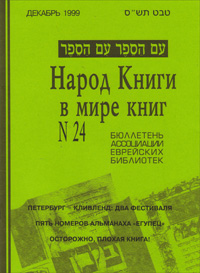The People of the Book in the World of Books is a Russian bimonthly publication for serious readers with Jewish interests. Our English website includes only the summaries of the published articles. To access the complete text of them, please visit the Russian version of this website.

|
||
|
This issue of the magazine includes:
• Exchange of Experience: Jewish Book Festival '99. St. Petersburg – Cleveland, Ohio, USA
Jewish Book Festivals took place approximately at the same time in two cities—one in Russia, another one in the USA. One of the magazine's editors had a chance to participate in both of them and to compare the two Jewish communities’ different conceptual approaches to organizing these cultural events.
• Overview: Jewish Literary Almanac Ehupets Published in Kiev, Ukraine
Ehupets is the name used for Kiev in Sholom-Aleichem's works, an ironic pseudonym of a city where Jews want to live, but where they are forbidden to live. Today Ehupets is the name of the annual miscellany which has been published since 1995 by the Kiev-based Institute of Judaic Studies. The magazine presents an overview of all issues published over the first five years of the almanac’s existense, concluding that Ehupets is one of the rare Jewish periodicals in the former USSR that has managed to go beyond the boundaries of the Jewish community. The almanac has taken its place among traditional literary magazines and is addressed to all intellectual readers.
• Response: The Struggle against Evil and Stupidity
The book Wise Jewish Tales was published in Minsk in 1999. The introduction tells us that the Jewish tales published in this collection are supposed to motivate readers to "struggle against evil and stupidity." But the reviewer thinks that the book itself is an example of evil and stupidity. The compilers included in their book fragments from different publications without providing relevant information about the sources of these fragments. The commentaries in the book have plenty of obvious mistakes. The tales from the Ashkenazi and Caucasian Jewish communities are mixed together without any explanations. The illustrations remind the readers of the anti-Semitic cartoons in Nazi newspapers. The reviewer expresses the hope that the potential customer will realize what the book is about before purchasing it, and not afterward.
• Jewish Calendar of Significant Dates: January–February 2000
• Bibliography: 33 New Books |


